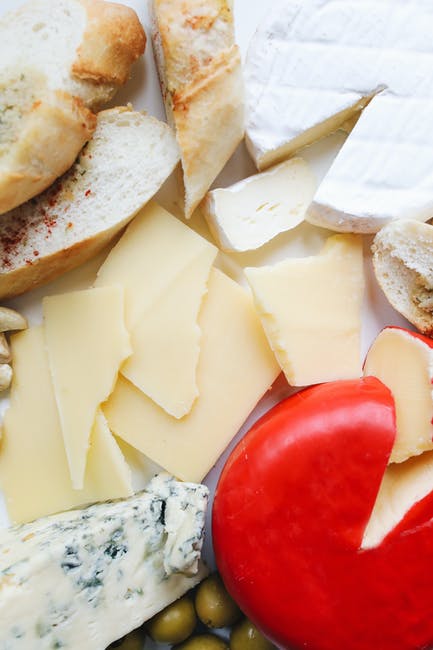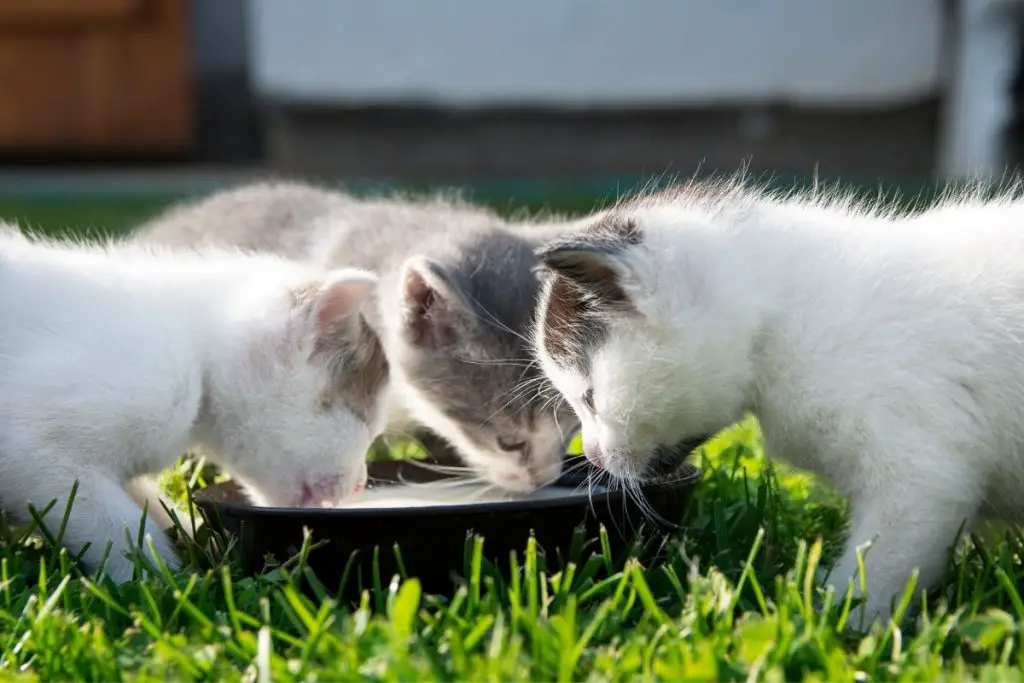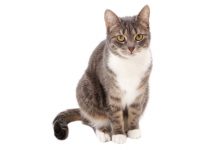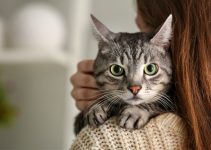When you imagine the platonic ideal of a cat, what comes to mind? For most people, it’s a pink-tongued feline lapping up a bowl of milk. In reality, if an adult cat consumed that amount of dairy, they’d be in big trouble! Did you ever wonder, “Can Cats Eat Cheese?” you are not alone. Continue reading and Lets find out….
Cats are obligate carnivores, which means that all of their nutrition comes from meat. Ideally, pet owners would feed their cats a complete and balanced diet that would keep them satiated. Anyone who knows cats knows that even a well-fed kitty will beg at the table if they smell something good – especially all types of cheese!
So, when faced with that sweet mewling face, what do you do? Should you give your cat a little bit of cheese as a treat? Could something go wrong if you do?
The answer is somewhat complex, so we’ve created this guide to help you decide. Keep reading to learn more about cat digestion, and which types of cheese to avoid if you want to keep your cat healthy.

Contents
The Feline Diet
Cats get all of the nutrition they need from meat, and the best thing to feed your cat is a specially formulated diet. This is the best way to ensure that your pet receives the correct amount of protein and fat in their diet. It also makes it easier to ensure that your cat’s sodium intake stays low and that they don’t consume unnecessary fat.
As kittens, however, cats live exclusively on their mother’s milk. This is all their tiny tummies can handle for approximately the first four weeks of life. After this point, kittens’ bodies stop producing the enzymes that help them break down lactose, which is a compound in milk.
The Problem With Cheese
Like humans, many cats are lactose intolerant and experience many of the same symptoms as a result. It is common for cats to suffer from diarrhea, vomiting, and constipation after consuming dairy products.
Some cats have a stronger response than others. They may require veterinary intervention after consuming lactose products.
Other cats have a weaker response to dairy. Some have no response at all. Does this mean you can feed them cheese with abandon?
While cheese contains plenty of protein, which is a staple of a cat’s diet, it also contains a great deal of fat. It is high in calories and does not add much actual nutrition to a cat’s diet. This can easily lead to obesity and related health problems over time.
Cheese also has a high sodium content, which can hurt cats with pre-existing health conditions. It can also do damage to a cat’s delicate organ systems over time. In high quantities, salt can be poisonous to cats.
Most vets recommend that no more than 10% of a cat’s intake should come from treats. If you feed your cat cheese, it’s easy to exceed this percentage without even realizing it. Cheese is a dense and efficient food, but will not have any positive benefit for well-nourished cats.

Can Cats Ever Eat Cheese?
What should you do if your cat has come to join you at the dinner table and is eyeing the mac and cheese with heart eyes? Are there any exceptions, or should you keep cheese from your cat full-stop?
A cat with lactose intolerance or a dairy allergy should never consume cheese. This could lead to serious dehydration requiring an emergency visit to the vet. It’s uncomfortable for your pet and not worth it!
If your cat can consume cheese with no issues, the general rule is to offer all treats in moderation, including cheese. A few spare shreds of organic cheddar on taco night won’t hurt.
Many pet owners take advantage of their feline’s love of cheese when they need to give their cat pills or medication. They will use cheese as a lure to convince their cat to consume the medicine. In most cases this should be fine, assuming it helps keep your pet healthy in the long run.
What Types of Cheese Are Okay for Cats?
If you are going to give Fluffy a cheesy snack on his birthday, you will want to be careful about the kind you choose.
In general, hard cheeses contain less lactose because cheesemongers remove the whey. Whey is the part of cheese that contains the most lactose. While this means they contain less fat than some cheeses, they also contain more sodium to compensate.
Thus, if you are going to give your cat cheese, stick to one of the following types:
- Parmesan
- Hard cheddar
- Gouda
- Swiss
Make sure to give your cat small, bite-sized pieces that they can easily chew. If you notice any adverse symptoms, monitor your cat closely and ensure that they have access to plenty of water. If symptoms persist, bring your cat to the vet immediately.
What Types of Cheese Should Cats Avoid?
There are many types of cheese that you should not feed to your cats under any circumstances. These include cheeses that contain onions or garlic, which are both toxic to cats.
You should also never feed your cat blue cheese or other “moldy” cheeses. The fungus in these types of cheese is also toxic to felines.
Most highly processed cheese is not appropriate for cats because of its high sodium content. This includes American cheese and “cheese products” like individually wrapped singles.
As a general rule, the softer the cheese, the higher the lactose content. Because all cats are technically lactose intolerant, you will want to avoid cheeses above a certain lactose threshold.
High-lactose cheese to avoid includes:
- Mozzarella (including string cheese)
- Cream Cheese
- Cottage Cheese
- Brie
Many pet owners wonder about dairy-free “cheese products.” These are traditionally intended for vegans or lactose intolerant humans.
In general, these products have less nutrition than full-dairy cheese. They contain a lot of fat and filler, and while it won’t necessarily harm your kitty, it won’t do much good, either.
Everything in Moderation
Even if your cat doesn’t have an issue with dairy and you feed them exclusively hard cheeses, you’ll want to take note of just how much you’re giving them. Because cheese is such an efficient food, half an ounce (half of one cheese cube) is the equivalent of an entire meal for an average-sized cat! When you take the salt and fat into account, it’s the nutritional equivalent of a fast-food cheeseburger with all of the fixings!
If you wouldn’t give your child a happy meal for dinner every night, it’s best not to make cheese a regular part of your cat’s diet. Just because they like it does not mean they need it! Many cats experience pica and will try to eat all sorts of things that they shouldn’t – so just because they beg doesn’t mean you should give in!
A piece of cheese now and then probably won’t hurt, but moderation will keep your furry friend much healthier in the long run.
Better Snack Options for Your Cat
If you want to give your pet a special treat, there are plenty of foods that are healthier than a hunk of swiss! Cats can eat quite a few fruits and vegetables, and love novel sources of protein. Store-bought treats for cats are also low in salt and calories and tend to have added benefits, such as reducing hairballs.
If you are in love with the idea of feeding your feline off your plate, here are some “people foods” that make fine treats:
- Cooked eggs (hardboiled, scrambled)
- Tuna fish
- Cooked shrimp
- Oatmeal made with water
- Cooked broccoli
- Cooked Squash
- Chicken
- Turkey
- Cantaloupe
When it comes down to it, cats don’t need snacks. Cats need meat, and can usually get all of the nutrition they need from a store-bought pet formula. This can be hard to remember because we love our pets and we want to go above and beyond to give them a satisfying life full of novelty!
If you really want to give your cat a treat, you might be better off going to the pet store and picking up a new toy. Consider a scratcher, wand, or set of springs. These toys will encourage healthy behavior in your cats, keeping them entertained, engaged, and fit!
Physical activity can also offset any treats that you do manage to sneak your cat!
Keep Your Kitty Healthy
When your cat looks up at you with those big eyes, it can be hard to stop yourself from reaching down and giving them a piece of gouda! While some types of cheese are okay for a sometimes treat, your best bet is to be thoughtful about all of the treats you give your cat. A cat’s diet is what keeps them going, and they deserve the best and most appropriate nutrition so they can thrive!
If you’re still inspired to feed your cat something unique, the AnimalFate blog can help! The blog is full of posts about the best and worst things to give your pets. For example, start by taking a look at this post about whether or not to give your cat oat milk.


